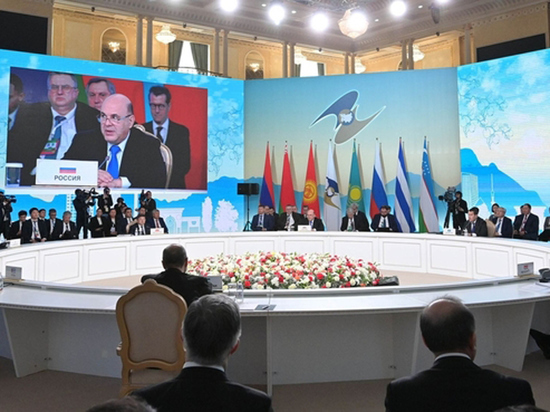Mishustin warned EAEU partners about the danger of colonial dependence
[ad_1]

Mikhail Mishustin suggested that Armenia, Belarus, Kazakhstan and Kyrgyzstan, together with Russia, fight colonial dependence on Western software and build the technological sovereignty of the EAEU. He called Russian developments, which are created as part of import substitution, an alternative to foreign hardware and software. The partners reacted with restraint: why reinvent the wheel if you can ride it.
On the basis of existing solutions and equipment, the countries of the union are successfully creating new products, including with the participation of Russian IT specialists who left.
Dmitry Medvedev also started attending the annual Digital Almaty forum in Kazakhstan. And perhaps this is the only tradition inherited from the former Prime Minister Mikhail Mishustin.
Every year the scale of the digital summit, held in the second largest city of Kazakhstan, is growing – this year more than 30 thousand people took part in it. The organizers did not hide the fact that some of the developments presented at the exhibition of digital projects were created with the participation of Russian IT specialists.
As early as March 2022, the Astana Hub International IT hub published instructions in js-developers chats on how relocators can open an IT company in Kazakhstan. This option was used by several Russian firms with extensive clientele in Western countries. And now the products they sell are considered Kazakhstani exports.
Mishustin and the heads of governments of other EAEU countries were shown bracelets that allow tracking the location and well-being of people working in potentially dangerous enterprises, such as in a mine. “The guys from Russia helped us develop this device,” the prime minister was told.
However, Mishustin was more interested in online mortgages issued using biometric data. In Kazakhstan, this project is being implemented with the participation of the Ministry of Justice and the National Bank. At the moment, approximately 50% of transactions are carried out in the virtual space without the participation of notaries and paper media.
Judging by Mishustin’s numerous questions, the prime minister would not mind introducing a similar system in the Russian Federation. But he doubts that the collection of biometrics will be positively perceived by the population. “When we make face-scanning technologies, not everyone uses it,” he lamented. “People go for it easily? Trust?” Mishustin clarified with his colleagues. It turned out that in Kazakhstan there are no problems with trust in the state: 80% of economically active citizens use Face ID technology. This is not only convenient, but also profitable: each online transaction saves about $300.
In general, Russia clearly has a lot to learn from Kazakhstan, and from other EAEU countries too. However, speaking at the plenary session of the forum, Mikhail Mishustin complained that interaction in the digital sphere between the closest partners is extremely slow. “For many years we have been trying to come to an agreement on the recognition of a digital signature or the launch of a common register of legal entities,” Mishustin said.
According to him, it took two years to resolve the contradictions in tax regulation that arose in connection with the development of electronic commerce. And so far, the Eurasian Commission cannot resolve the simple issue of entering the vehicle’s VIN number into the union database. Some participants believe that this may pose a threat to the national sovereignty of the five states. “That’s stupid!” – Mishustin commented in his hearts.
The head of the Russian Cabinet said that the EAEU countries should not only actively implement digital solutions, but also join forces to achieve technological sovereignty. “The lack of own developments means colonial dependence – on those countries that have them and promote them on a global scale,” he said. Last year, according to Mishustin, demonstrated that one cannot “rely on Western companies as suppliers of hardware, software and technology.”
“At one fine moment, access to them may be blocked,” the prime minister warned, without specifying that the decision of global IT companies to stop working in Russia was caused by very specific reasons, and there were no such problems before the start of the special operation.
Mishustin said that for the majority of foreign software – 85% – there are already Russian counterparts. “We have something to offer,” he stressed, noting that when selecting high-tech projects, the possibility of their replication and export potential are taken into account. Not to mention that they are in no way inferior to foreign products.
“Almost 200 initiatives have been selected. Over 30 will be implemented during this and next years,” the prime minister spoke about the immediate plans of the Russian IT industry. He invited IT specialists from the EAEU to come to work in Russia: under the new law, they and their family members will be able to obtain a residence permit in a simplified manner.
However, judging by the speeches of Mishustin’s colleagues, other EAEU countries do not share the beliefs about colonial dependence. And they expect to continue using familiar Western products, while not denying the need to develop digital cooperation within the EAEU. The Prime Minister of Kazakhstan, Alikhan Smailov, proposed to the Union countries to synchronize the radio frequency spectrum, the head of Armenia, Nikol Pashinyan, and the Prime Minister of Kyrgyzstan, Alykbek Zhaparov, spoke in favor of the exchange of medical information, and the head of the government of Belarus, Roman Golovchenko, once again promoted the recognition of an electronic digital signature within the EAEU.
[ad_2]
Source link






